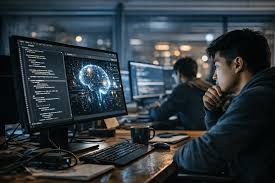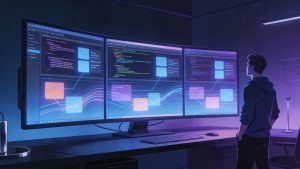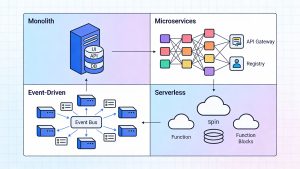October 2025 has marked a pivotal moment in the evolution of software development. Artificial intelligence has become the foundation of how teams build, secure, and scale digital solutions. New releases from tech giants, cybersecurity warnings, policy shifts, and changing investment landscapes are collectively redefining the global tech ecosystem.
Microsoft Introduces Its Agent Framework
Microsoft’s recent preview of the Agent Framework represents a major step forward in AI-powered software engineering. Built for .NET and Python, this open-source toolkit enables developers to create intelligent AI agents and link them into graph-based workflows.
The framework allows software teams to design agents that interact dynamically, execute complex decision-making processes, and automate repetitive operations. For developers in agile environments, it delivers faster prototyping and better interoperability.
More than just a corporate innovation, this release democratizes access to advanced AI-agent architectures for startups and smaller engineering teams, helping them accelerate automation and integration without extensive overhead.
Anthropic’s Claude Sonnet 4.5: Setting a New Standard for AI Coding
September 2025’s breakthrough from Anthropic, the launch of Claude Sonnet 4.5, continues to make waves in software development. Positioned as one of the most capable coding models yet, it achieved a 77.2% score on the SWE-bench benchmark, outperforming previous AI engineering systems.
This model excels in writing, debugging, and optimizing code—key aspects for teams building AI-integrated products. Claude Sonnet 4.5’s strength in agent-based workflows dovetails perfectly with the rising demand for AI-assisted development tools, empowering developers to focus on innovation while delegating routine technical tasks to smart agents.
By combining such advanced models with frameworks like Microsoft’s Agent Framework, the software development cycle could soon see a powerful synergy of automation and creativity.
Cybersecurity Concerns: Lessons from South Korea
While AI dominates the spotlight, cybersecurity remains an urgent global challenge. Recent breaches in South Korea have revealed vulnerabilities in even the most technologically advanced systems, with data leaks now occurring almost monthly.
These incidents highlight the need for proactive security integration in the software development lifecycle. Developers must embed protection measures directly into their codebases—leveraging AI-based threat detection, encryption, and continuous monitoring.
As software becomes increasingly dependent on interconnected AI systems, building resilient and compliant architectures is not optional—it’s essential for preserving user trust and business continuity.
Labor Law Shifts: Gig Economy and Tech Implications
In policy news, California’s new law granting Uber and Lyft drivers the right to unionize marks a major milestone for the gig economy. While this might seem tangential to software engineering, it directly impacts how tech teams design and operate platforms supporting gig-based services.
For developers, new compliance requirements will likely affect application backends, user data policies, and interface designs. Features such as dispute resolution tools, earnings transparency, and worker data protection could become standardized expectations.
These changes reinforce the idea that technology is deeply human—every code decision affects real-world workers. The new regulations may prompt software teams to embed fairness, ethics, and inclusion principles directly into product development cycles.
The AI Investment Boom: Funding Shifts in 2025
The venture capital landscape is undergoing a seismic transformation. Data shows that 2025 is set to become the first year when AI startups attract more than half of all VC funding globally. While this influx of capital accelerates AI innovation, it creates unique challenges for non-AI startups.
For founders and software developers, AI integration is now almost mandatory to remain competitive. Investors are favoring projects that incorporate intelligent automation, predictive analytics, or generative AI capabilities.
This funding polarization encourages innovation but risks narrowing diversity in the startup ecosystem. Developers must therefore explore hybrid approaches—leveraging AI to enhance solutions without being overly dependent on it. Businesses that find this balance will stand out in an increasingly AI-dominated market.
Redefining the Software Development Landscape
The convergence of AI agents, cybersecurity, and automation frameworks signals a broader transformation in how software is built and delivered. Developers are shifting from manual coding toward orchestration—configuring AI tools to manage large parts of the development and testing process.
Meanwhile, enterprises are adopting security-first architectures that integrate AI-driven threat detection from the early stages of deployment. Governments, regulators, and businesses alike are beginning to recognize that robust, ethical, and transparent AI practices will shape the sustainability of digital innovation.
October 2025 stands as a clear inflection point—marking not only progress in AI frameworks but also the growing need for responsible engineering principles. The software industry is entering a phase where AI isn’t an enhancement—it’s the core of how development, security, and business growth converge.
Read more such articles from our Newsletter here.



